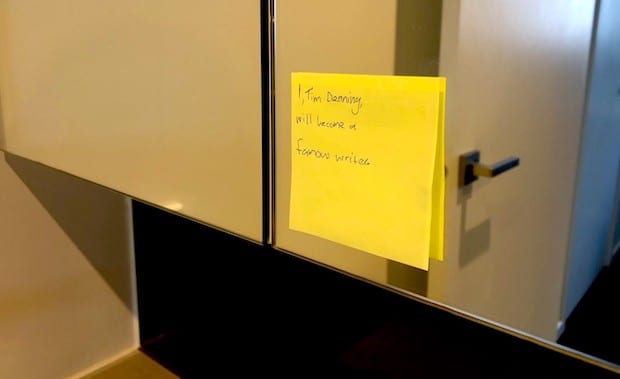Success Advice
It’s Not How Smart You Are That Defines Your Career — It’s This

Look around the office you work in. Some people are managers. Some people make six-figure salaries. Some people are senior executives. Some people work in customer service on the frontline.
It’s a big mistake to think that where you are in your career has something to do with how smart you are.
I’ve met many smart people who crash and burn in their careers because they have to be always right or they overthink, or they know a lot about the wrong things or they have very low emotional intelligence causing them to upset many people at the same time.
If being smart made us successful then we’d all go and consume endless information and become millionaires shortly after.
Being smart is not enough.
So what does define your career and the success you have?
1. How badly you want it
The woman/man that became CEO wanted it more.
The person with the 7-figure business wanted it more.
The woman that won an Olympic Gold Medal wanted it more.
You have to want your goals really, really, really bad.
Wanting something so badly that you’re prepared to do anything to get there (ethically) is how you get the energy to overcome the rejection and failure it’s going to take to get reach that point.
I wanted to share my story and inspire people with it very badly. I thought of creating a WordPress website, but I had no idea how to and had zero technical skill. My knowledge of how to market that website was also zero.
I tried creating a Facebook Page and to date, it still has less than 3000 followers which means I fall short by a lot in terms of my target to inspire millions of people.
I tried using Twitter and reaching people that way. I was never able to get any real engagement. I’d tweet Elon Musk. I’d message Tony Robbins. I’d write the best tweet humanly possible. It all led nowhere.
I tried using a blogging platform called Medium. I was able to build a small following, but most people in my area of the world don’t use it. I still came up short of my goal.
Then, I tried writing on a blog that already had lots of viewers called Addicted2Success and began posting on LinkedIn daily.
Everything changed. I wanted to inspire people so badly that I kept trying until I found a platform that worked for what I had to say. Wanting it badly enough was what helped me keep going from 2014 until now. It didn’t stop there, though.
When my career took a turn down a black hole, my motivation died. Suddenly, writing on Addicted2Success and LinkedIn became hard. I didn’t want it as bad because the pain caused by my work life was too much. I let things slip temporarily for about 3 weeks. Engagement went to an all-time low.
It didn’t last long, though. Why? My thinking changed when I reminded myself how upset I would be if I didn’t achieve my goal. It meant far too much and in the back of my mind, I still wanted it badly.
I went back over all the emails from people I’d helped and that spark came back. Deep down, I still wanted it badly. I still wanted to inspire millions of people.
Wanting it bad was what helped me to revive my blogging career and continue helping millions of people.
Wanting it badly will define your career.
2. What you think is possible
I met a guy earlier in the year that came from a farm in the middle of Outback Australia.
He’d sold his digital marketing business for a lot of money and banked a huge amount of coin as a result. He had no tech background. He had no business knowledge. He didn’t have seven-figure friends that drove Bentley’s.
What he had was an uncanny ability to think anything was possible. He saw himself rising above his circumstances even though he had no evidence to prove that he could do so. He worked long hours and built up a team of cult followers. They learned together how to get businesses exposure through social media and search engines.
For many of the people on his team, it was their first job. He didn’t pay them well because he couldn’t. All he thought was that one day, together, they’d do something incredible — and they did.
A lot of what happens in your career is based on how you think. If you think you can never be a manager, entrepreneur or executive, then you won’t be.
If you think you can be good at public speaking, you might.
If you think you can hit your sales target, you might.
If you think you can start a successful business, you might.
If you’re not successful right now, you will be.
“It’s only a matter of time until one of the bets in your career pays off”
It’s a combination of being ready, being humble, thinking right and having the skills to execute. Not thinking you can achieve big will rob you of whatever it is that you want in your career.
I shouldn’t be a successful blogger because I can’t write that well, I have bad spelling/grammar skills, I don’t own a blog and I’m not filthy rich. Despite all that I’ve achieved my blogging goal.
I saw my goal become possible before anybody else did.
I told myself that every major challenge was necessary for me to eventually get what I wanted. I thought my goal was possible even though all the facts suggested it wasn’t. Instead of relying on data I relied on my own mind to lead me down the right path.
I chose to believe when no one else did.
This very way of thinking is not unique to me. Many of the leaders around the world that shape the human race think in the same way.
What you think is possible in your career will define what goals you can achieve.
Your thinking defines your career.
Being smart isn’t enough.
Shift Your Mindset
SEO Secrets That Separate Struggling Hustlers from Thriving Winners
Zero-click searches and AI Overviews are crushing old tactics – the brands building unshakable SEO authority are pulling ahead fast.

One guy pours endless hours into blog posts, tweaking meta tags, begging for links – traffic flatlines. Another quietly builds something solid, updates once a quarter with fresh proof, gets cited in AI answers… and suddenly leads roll in without him lifting a finger for ads. (more…)
Entrepreneurs
Why Future Leaders Master New Technologies Early
The leaders who shape tomorrow aren’t waiting for change – they’re building digital fluency and strategic control early.

Leadership today grows in a digital environment where technology shapes almost every decision and opportunity. People who start using new tools early often think faster, learn more efficiently, and act with more confidence. (more…)
Entrepreneurs
The Six Pillars That Ground Purpose-Driven Leadership (The Berenyi Life Blueprint)
When high performance starts to feel hollow, these six leadership pillars rebuild clarity, stability, and long-term success.

Throughout my years coaching leaders, I’ve seen firsthand how many high-performers hit a point where the external success is growing, but the internal clarity is shrinking. (more…)
-

 Business4 weeks ago
Business4 weeks agoEntrepreneur’s Guide to Pay Stubs: Why Freelancers and Small Business Owners Need a Smart Generator
-

 Business4 weeks ago
Business4 weeks agoThe Salary Shift Giving UK Employers An Unexpected Edge
-

 Scale Your Business4 weeks ago
Scale Your Business4 weeks ago5 Real Ways to Grow Your User Base Fast
-

 Business4 weeks ago
Business4 weeks agoThe Simple Security Stack Every Online Business Needs
-

 Finances4 weeks ago
Finances4 weeks agoWhy Financial Stress Is One of the Biggest Barriers to Personal Growth
-

 Business3 weeks ago
Business3 weeks agoWhy Entrepreneurs Should Care About AI Automation Testing
-

 Business3 weeks ago
Business3 weeks agoWhy Smart FMCG Entrepreneurs Outsource What They Can’t Automate
-

 Business3 weeks ago
Business3 weeks agoWhat Every Business Owner Should Know Before Investing in API Integration
























1 Comment